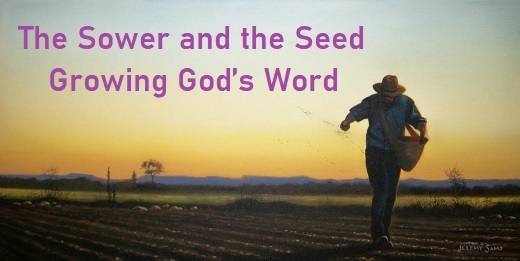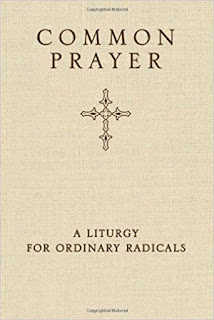The Sunday Lectionary Readings
SUNDAY, July 12, 2020 — 6th Sunday After Pentecost
[Ordinary 15, Proper 10]
(Revised Common Lectionary Year A)
Growing God’s Word
Genesis 25:19-34; Psalm 119:105-112; Romans 8:1-11; Matthew 13:1-9, 18-23
Opening Prayer
God of abundant love, we come to you this day in the midst of a season of great growth and coming harvest. All around us are signs of growth, in our earth, in our families, in our nation, in our world. We come this day, seeking your healing love and abounding mercy. Open our hearts to receive all that you offer that we may become fruitful workers for you. Amen.
Prayer of Confession
Seed-scattering God, we come to you this day with so many things on our hearts and minds. Some of the events this week have been very positive and have caused us to celebrate; but we are constantly besieged by worries, doubts and fears. These negative things crowd out your word and we become like the useless soil, unable to receive and grow. Slow us down. Continue to pour your love on us because we really hunger and thirst for it. Forgive us when we allow all the negativity to drown out your word. Scatter again the seeds of peace, love, hope and joy that we may be better disciples for you in this world which is in so much pain. Amen.
Words of Assurance
Here’s the Good News! God is never going to stop showering us with God’s love…all the time, everywhere…always for us.
Hallelujah!
The Collect
(from the Book of Common Prayers)
O Lord, mercifully receive the prayers of your people who call upon you, and grant that they may know and understand what things they ought to do, and also may have grace and power faithfully to accomplish them; through Jesus Christ our Lord, who lives and reigns with you and the Holy Spirit, one God, now and for ever. Amen.
Prayer of the Day
Almighty God, we thank you for planting in us the seed of your word. By your Holy Spirit help us to receive it with joy, live according to it, and grow in faith and hope and love, through Jesus Christ, our Savior and Lord. Amen.
First Reading
Esau sells his birthright to Jacob
25:19 This is the account of the family line of Abraham’s son Isaac.
Abraham became the father of Isaac, 20 and Isaac was forty years old when he married Rebekah daughter of Bethuel the Aramean from Paddan Aram and sister of Laban the Aramean.
21 Isaac prayed to the Lord on behalf of his wife, because she was childless. The Lord answered his prayer, and his wife Rebekah became pregnant. 22 The babies jostled each other within her, and she said, “Why is this happening to me?” So she went to inquire of the Lord.
23 The Lord said to her,
“Two nations are in your womb,
and two peoples from within you will be separated;
one people will be stronger than the other,
and the older will serve the younger.”
24 When the time came for her to give birth, there were twin boys in her womb. 25 The first to come out was red, and his whole body was like a hairy garment; so they named him Esau. 26 After this, his brother came out, with his hand grasping Esau’s heel; so he was named Jacob. Isaac was sixty years old when Rebekah gave birth to them.
27 The boys grew up, and Esau became a skillful hunter, a man of the open country, while Jacob was content to stay at home among the tents. 28 Isaac, who had a taste for wild game, loved Esau, but Rebekah loved Jacob.
29 Once when Jacob was cooking some stew, Esau came in from the open country, famished. 30 He said to Jacob, “Quick, let me have some of that red stew! I’m famished!” (That is why he was also called Edom.)
31 Jacob replied, “First sell me your birthright.”
32 “Look, I am about to die,” Esau said. “What good is the birthright to me?”
33 But Jacob said, “Swear to me first.” So he swore an oath to him, selling his birthright to Jacob.
34 Then Jacob gave Esau some bread and some lentil stew. He ate and drank, and then got up and left.
So Esau despised his birthright.
Your word is a lamp to my feet
105 Your word is a lamp for my feet,
a light on my path.
106 I have taken an oath and confirmed it,
that I will follow your righteous laws.
107 I have suffered much;
preserve my life, Lord, according to your word.
108 Accept, Lord, the willing praise of my mouth,
and teach me your laws.
109 Though I constantly take my life in my hands,
I will not forget your law.
110 The wicked have set a snare for me,
but I have not strayed from your precepts.
111 Your statutes are my heritage forever;
they are the joy of my heart.
112 My heart is set on keeping your decrees
to the very end.
Second Reading
Living according to the Spirit
8:1 Therefore, there is now no condemnation for those who are in Christ Jesus, 2 because through Christ Jesus the law of the Spirit who gives life has set you free from the law of sin and death. 3 For what the law was powerless to do because it was weakened by the flesh, God did by sending his own Son in the likeness of sinful flesh to be a sin offering. And so he condemned sin in the flesh, 4 in order that the righteous requirement of the law might be fully met in us, who do not live according to the flesh but according to the Spirit.
5 Those who live according to the flesh have their minds set on what the flesh desires; but those who live in accordance with the Spirit have their minds set on what the Spirit desires. 6 The mind governed by the flesh is death, but the mind governed by the Spirit is life and peace. 7 The mind governed by the flesh is hostile to God; it does not submit to God’s law, nor can it do so. 8 Those who are in the realm of the flesh cannot please God.
9 You, however, are not in the realm of the flesh but are in the realm of the Spirit, if indeed the Spirit of God lives in you. And if anyone does not have the Spirit of Christ, they do not belong to Christ. 10 But if Christ is in you, then even though your body is subject to death because of sin, the Spirit gives life because of righteousness. 11 And if the Spirit of him who raised Jesus from the dead is living in you, he who raised Christ from the dead will also give life to your mortal bodies because of his Spirit who lives in you.
Gospel Acclamation
Alleluia.The word is very near to you; it is in your mouth and in your heart.
Alleluia.
The Gospel
The parable of the sower and the seed
13:1 That same day Jesus went out of the house and sat by the lake. 2 Such large crowds gathered around him that he got into a boat and sat in it, while all the people stood on the shore. 3 Then he told them many things in parables, saying: “A farmer went out to sow his seed. 4 As he was scattering the seed, some fell along the path, and the birds came and ate it up. 5 Some fell on rocky places, where it did not have much soil. It sprang up quickly, because the soil was shallow. 6 But when the sun came up, the plants were scorched, and they withered because they had no root. 7 Other seed fell among thorns, which grew up and choked the plants. 8 Still other seed fell on good soil, where it produced a crop—a hundred, sixty or thirty times what was sown. 9 Whoever has ears, let them hear.”
18 “Listen then to what the parable of the sower means: 19 When anyone hears the message about the kingdom and does not understand it, the evil one comes and snatches away what was sown in their heart. This is the seed sown along the path. 20 The seed falling on rocky ground refers to someone who hears the word and at once receives it with joy. 21 But since they have no root, they last only a short time. When trouble or persecution comes because of the word, they quickly fall away. 22 The seed falling among the thorns refers to someone who hears the word, but the worries of this life and the deceitfulness of wealth choke the word, making it unfruitful. 23 But the seed falling on good soil refers to someone who hears the word and understands it. This is the one who produces a crop, yielding a hundred, sixty or thirty times what was sown.”
Here end the Readings
Click HERE to read today’s Holy Gospel Lesson message
- I believe in God, the Father almighty, creator of heaven and earth.
- I believe in Jesus Christ, his only son, our Lord, who was conceived by the power of the Holy Spirit and born of the Virgin Mary, suffered under Pontius Pilate, was crucified, died, and was buried; he descended to hell. On the third day he rose again; he ascended into heaven, and is seated at the right hand of the Father, and he will come again to judge the living and the dead.
- I believe in the Holy Spirit, the holy catholic church, the communion of saints, the forgiveness of sins, the resurrection of the body, and the life everlasting. Amen.
Holy Communion
A nondenominational serving of bread and wineMany churches around the world are working hard to adapt to online worship, and one challenge is how our members can celebrate communion from home. Though no video can truly replace the experience of celebrating together in our places of worship, we know that where two or more are gathered, the Lord is present.
Benediction
As you have received the seeds of faith and hope; go now into God’s world to scatter the seeds of reconciliation and peace, in the name of the Father, the Son and the Holy Spirit. Amen.
Optional parts of the readings are set off in [square brackets.]The Daily Lectionary for SUNDAY, July 12, 2020 — 6th Sunday After Pentecost
The Bible texts of the Old Testament, Epistle, and Gospel lessons are from The Holy Bible, New International Version®, NIV® Copyright ©1973, 1978, 1984, 2011 by Biblica, Inc.® Used by permission. All rights reserved worldwide.
Growing God’s Word
Genesis 25:19-34; Psalm 119:105-112; Romans 8:1-11; Matthew 13:1-9, 18-23








